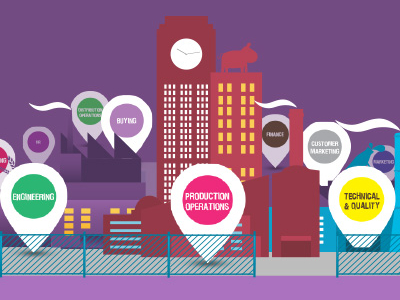What’s it all about then?
As the Learning & Development Manager for a food company you’ll be responsible for all of the learning and professional development of the workforce.
It’s a strategic role and you’ll be assessing the levels of skills and knowledge of staff at every level of the company and taking the action needed to maintain and develop these skills for the ultimate benefit of your employer.
This means determining the best training initiatives that will equip staff to best carry out their jobs and develop their careers; you might design and deliver this training yourself or bring in external experts as required.
What might I be doing?
This job is likely to prove to be sub-sector specific even within the food manufacturing sector and the level of responsibility and variety of activities is dependent on the type and size of organisation.
However it’s likely that the following tasks will be part of the role:
- Using job analysis tools, appraisals and consultations with colleagues to identify the training and development needs of your company
- Designing training and development programmes based on the needs identified
- Effectively budgeting for the costs of planned programmes and ensuring that these programmes demonstrate a return on investment
- Producing training materials for in-house courses as required
- Devising and implementing the learning and development strategy for the company
- Ongoing monitoring and review of overall learning strategy and individual programmes and amending these for improvement if needed
- Maintaining up to the minute knowledge of all relevant developments in learning and development, both in food and also other sectors
- Developing strategies for learning and development using new technologies
What will be expected of me?
You’ll be the sort of person who enjoys working with people you’ll be the company champion for learning and development. Often this means selling your ideas and changing ingrained ideas at all levels of the company so your communication skills will be exceptional, as well as the ability to solve problems.
You will have to show a lot of drive and enthusiasm in a role such as this and you’ll be expected to show a personal commitment to your own development as well as that of everyone else.
You’ll need to be an innovative type of person who is unafraid of criticism and can adapt to new ideas and be able to align your strategy to the long term plans of the business. This means understanding the business inside out.
What can I expect?
The strategic nature of the job means that you’re likely to work 9am to 5pm although extra hours are a standard feature of a senior role in food manufacture with meetings etc happening at either end of the day.
If you work for a multi-site employer you can expect a lot of travel as you co-ordinate the learning and development throughout the company, which can be a challenge if you’re employed in a business that has grown quickly by purchasing other enterprises.
What qualifications do I need to get in?
You will need a degree and lots of previous relevant experience if you want the Learning and Development manager role.
Subjects such as HRM, Business and Psychology are common for someone starting out in a junior role in training. As a food sector worker, a food related qualification is also helpful.
Entry into training and development is possible without a degree, particularly if relevant experience and skills have been attained.
What about further training?
Although a postgraduate qualification is not necessary, a Masters degree or diploma recognised by the CIPD will enhance your career prospects.
These include:
- CIPD Level 3 Foundation Certificate in HR Practice
- CIPD Level 3 course in Learning and Development Practice
Additionally there are loads of different part time qualifications that you can choose from and these range from broadly based to role specific – it’s entirely up to you and your employer!
Anything else I might need to know?
Specialisation in training and development often follows general personnel experience, and new graduates are not always recruited straight into a training role. It is also fairly common to work your way up from roles such as assistant training officer or administration assistant.
 cy
cy





